Shannon Des Roches Rosa
These iPads have been around for almost three years now, which is rather mind-boggling. Even though tablets no longer attract sideshow-level reactions with every mention, they are still wonderful tools for many autistic kids and adults, and exciting new approaches and apps keep emerging. I teach autism and iPads workshops all over the country (including a class at San Jose’s Morgan Autism Center on February 9th); the following is a general outline of what I’ll discuss, and my current take on iPads and autism.
Tablets: Tools, Not Miracles
- My initial response to seeing my autistic son kick butt using an iPad was elation, because he was instantly able to learn and entertain himself independently.
- However, tablets are not for everyone. Evaluate tablets and apps before buying.
- Tablets encourage presuming competence by enabling visual and alternative communication and learning.
- Competence expressed and recognized increases self-confidence.
Benefits: Accessibility and Convenience
- No cursor analogy — direct touch screen
- Fine motor ease — stylus/mouse not required (and switch accessories now available)
- So very portable (but invest in a good case, if fragility is a concern)
- Can replace backpacks — and cupboards — of activities
- App content is not static, contents updates are often free
Benefits: Learning
- So much more than an AAC device! (Non-dedicated device status can be an issue, less so with Guided Access)
- Screen is big enough to be digital parallel to paper or books
- Keyboard and screen are in same space, don’t have to move eyes from screen to keyboard
- Apps are organized, accessible, predictable framework
- Apps break learning down into discrete chunks, topic areas
- Learn without needing to read, including read-aloud books
- Learn independently or with support (but always supervised)
- Incidental learning opportunities abound
Benefits: Social and Play
- iPads are cool, they attract other kids – including siblings
- Can support social skills, formally and informally
- Custom story apps allow preparing for transitions, routines, meeting new people – or re-experiencing said scenarios
- Face-blindness (common in autism): labeling and other photo-content apps can enable associating names and characteristics with people
- Independent leisure time: Learning activities, games, videos
Best Practices
- Evaluate thoroughly before buying: Tablets are expensive, apps are expensive
- Get professional evaluation for AAC apps
- Different systems work for different users
- If long-term AAC use is expected, do not want to re-learn communication system
- Get fully informed before upgrading, e.g., iOS 6 deleted YouTube app
Overuse and Abuse?
- What about reports like “Autistic Kids Obsess Over Screen Technology”?
- Autistic adults say “Yes, we’re visual and very focused, why not explore how to harness these traits productively.”
- Savvy iPad-using autistic kids can be experts, help other kids, mentor them.
- Makes me laugh, for kids like Leo, for whom independent is good!
- Valid concern for kids who crave screen time (evaluate screen time-limiting apps like Screen Time).
Autism, iPads, and Apps Resources
• iPad Apps for Autism spreadsheet – a collaborative effort with an SLP (Jordan Sadler) and an autistic adult (Corina Becker): www.squidalicious.com/2011/01/ipad-apps-for-autism-spreadsheet-of.html
• My iPad Resource page: www.squidalicious.com/p/ipads-and-autism.html
• Autistic Adult App Project: autisticapp.blogspot.com
• Eric Saliers, Speech Language Pathologist: ericsailers.com
• GeekSLP TV www.youtube.com/user/GeekSlp?feature=watch
• IEAR: I Educational Apps Review: www.iear.org
• Moms With Apps: momswithapps.com
• Jordan Sadler, SLP: www.jordansadler.net
• Smart Apps for Kids: www.smartappsforkids.com
• Surprisingly Educational Apps: list.ly/list/1Ge-surprisingly-educational-apps?feature=mylist
• Tech in Special Ed: techinspecialed.com
